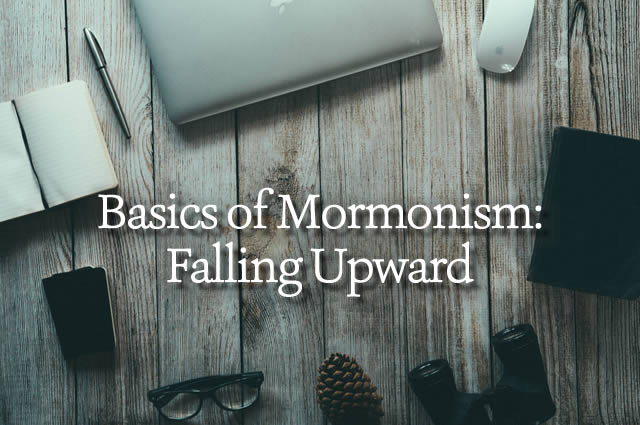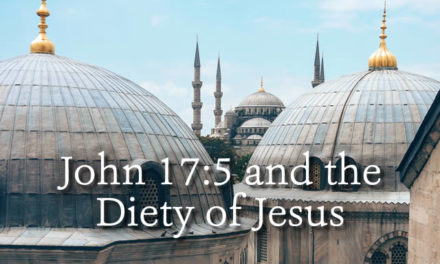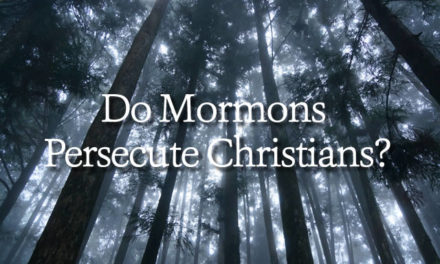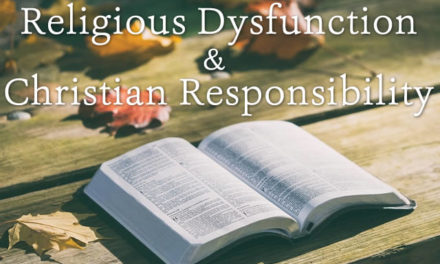In his book, A New Witness for the Articles of Faith, (NWAF) one of Mormonism’s foremost modern apostles, Bruce R. McConkie, expends three chapters explaining the meaning of the Mormon church’s second Article of Faith: “We believe that men will be punished for their own sins, and not for Adam’s transgression.” This Mormon Article of Faith presupposes sin and the fall of Adam. To properly understand it, or the third Article which follows it, requires an understanding of the Mormon concept of Adam’s fall. Says McConkie, “It is not possible to believe in Christ and his atoning sacrifice, in the true and full sense required to gain salvation, without at the same time believing and accepting the true doctrine of the fall” (NWAF, p. 82).
Humanity’s Pre-Mortal Existence
To understand the Mormon concept of the Fall, however, requires still prior understanding of the Mormon concepts of a pre-mortal existence, and the purpose of this earth life. Mormonism teaches that mankind is of the same species as God. Our origin is supposed to have been as procreated children of God, born as spirits in some other realm. In this spirit world existence we progressed as far as was possible. But to become truly like our Heavenly Father we needed to obtain physical bodies. We also needed to learn the difference between good and evil, truth and error, and to love and choose the former over the latter. Since our Heavenly Father has progressed so far that He cannot allow evil into His presence, it was necessary for us to leave Him for some place where we could encounter and overcome evil ourselves.
Earth Life A Test
So, this world was prepared as a school, where we have been sent to obtain physical bodies and to learn the lessons of mortality. In his book, The Miracle of Forgiveness, (MF), Mormon church President and Prophet Spencer W. Kimball described our mission for this life. “We would be expected to gain knowledge, educate ourselves, train ourselves. We were to control our urges and desires, master and control our passions, and overcome our weaknesses, small and large. We were to eliminate sins of omission and of commission, and to follow the laws and commandments given us by our Father” (p. 5; emphasis added).
This is in accord with Mormon scripture in the Pearl of Great Price, (PGP). While laying their plans for our earth life, the Gods are supposed to have said, “And we will prove them herewith, to see if they will do all things whatsoever the Lord their God shall command them;” (PGP, Abraham 3:25; emphasis added).
Conflicting Commandments
Of course for this whole plan to work, physical bodies had to be prepared in which Heavenly Father’s spirit children could dwell. Thus, the first commandment on record is the commandment to Adam and Eve to be fruitful and multiply, and fill the earth. Mormonism teaches this was a greater and more important commandment than the commandment not to eat of the Tree of Knowledge of Good and Evil (Talmage, Articles of Faith, pp. 64-5).
In fact, according to Mormon doctrine, the two commandments stood in opposition to each other (McConkie, NWAF, p. 91). Notwithstanding the great importance of procreation to the purpose of earth life, when God made Adam and Eve, He supposedly made them in a condition where they could not procreate. “There was as yet neither procreation nor death. These would enter the scheme of things only after the fall” (Ibid., p. 84). Adam and Eve had to break the lesser commandment, and incur the Fall, in order to fulfill the greater commandment (Ibid., p. 91).
According to Mormon scripture, Eve is supposed to have exclaimed, “Were it not for our transgression we never should have had seed, and never should have known good and evil, and the joy of our redemption, and the eternal life which God giveth unto all the obedient” (PGP, Moses 5:11).
The Book of Mormon (BM) says the same: “…if Adam had not transgressed…. they would have had no children; wherefore they would have remained in a state of innocence, having no joy, for they knew no misery; doing no good, for they knew no sin….Adam fell that men might be;” (BM, 2 Nephi 2:22-23).
A Fall in the Right Direction?
From the foregoing one can see how important it was for man to “fall” – why, in Mormonism, “the Fall” is seen as a good thing, a great blessing. This has led some Mormon leaders to say things which may sound a little odd or even bizarre to Christians familiar with the Bible. For example: Under the heading, “‘TRANSGRESSION’ NOT ‘SIN’ OF ADAM,” Mormon apostle and prophet Joseph Fielding Smith, Jr. wrote, “I never speak of the part Eve took in this fall as a sin, nor do I accuse Adam of a sin” (Doctrines of Salvation, (DS), vol. 1, p. 114). Again, “This was a transgression of the law, but not a sin in the strict sense, for it was something that Adam and Eve had to do!” (Ibid., p. 115). “The ‘fall’ of Adam and Eve was not a sin but an essential act upon which mortality depends” (Smith, Answers to Gospel Questions, vol. 5, p. 15).
Bruce R. McConkie wrote, “We do not know how the fall was accomplished…” (NWAF, p. 85; emphasis added). He goes so far as to cast the Fall in terms of obedience rather than transgression: “After they had thus complied with whatever the law was that brought mortality into being,…” and “He [Adam] chose the Lord’s way;” (Ibid., pp. 86, 91; emphasis added). Assistant to the Twelve Apostles Sterling W. Sill spoke of Adam’s fall: “Adam fell, but he fell in the right direction. He fell toward the goal…. Adam fell, but he fell upward” (Deseret News, Church Section, 31 July 1965, p. 7).
Since the mortal condition was essential to the Mormon plan of salvation, the act, which introduced mortality of necessity, becomes a great blessing. “We can hardly look upon anything resulting in such benefits as being a sin, in the sense in which we consider sin” (Smith, DS, vol. 1, p. 115). “Properly understood, it becomes apparent that the fall of Adam is one of the greatest blessings ever given of God to mankind” (McConkie, NWAF, p. 87).
Mormonism says we will not be punished for Adam’s transgression because all mankind will be redeemed from the effects of the “Fall.” That is, the consequences of Adam’s action – physical, or temporal death, and spiritual death – are both overcome through the Atonement of Christ (Ensign, January, 1990, pp. 25-6). “Temporal death is the natural death; it occurs when body and spirit separate, thus leaving the body to return to the dust whence it came. Spiritual death is to be cast out of the presence of the Lord and to die as pertaining to the things of righteousness” (McConkie, NWAF, pp. 86-7). Since it was not our fault that either of these were introduced, they will both be removed by God’s free grace. All mankind will be resurrected with immortal physical bodies, and all will be brought back into the presence of God, for judgment (BM, 2 Nephi 2:10). Those who are subsequently cast out are ejected for their own unrepented sin (BM, 2 Nephi 9:38, 45-6).
Questions for Mormons
With all the above as background, it is easy to see why Mormonism’s second Article of Faith says mankind will not be punished for Adam’s transgression. One wonders, in fact, why Adam was ever punished for it himself – why he and his descendants were ever placed under a curse in the first place.
If death is the wages of sin (Romans 6:23), and Adam’s and Eve’s action was not actually sin, then why did it introduce death into the world (Romans 5:12)? Indeed, how did it introduce sin into the world (Romans 5:12)? Just how and why were the “wonderful blessing” of mortality and a sinful world introduced, if it was not actually sin they committed?
And if this was such a blessing, then when they heard God walking in the Garden, why did they not go running to Him clapping their hands, breathless with excitement over fulfilling His plan, acquiring new knowledge, and initiating mortality? “Oh, Father! We have complied with Your greater commandment and are ready for procreation. Now the rest of Your children, our brothers and sisters, will have opportunity to enjoy the same wonderful benefits as us!”
Why, instead, did they suddenly feel guilty and afraid, and try to hide from God? Previous to that time they had no more idea of guilt than they did of right and wrong, so it could not have been a false, self-imposed guilt. It had to have been consciousness of the actual guilt of doing wrong. If their action was not sin, how did they acquire their sudden awareness of right and wrong (Genesis 3:7, 22)? Why did they seek to put blame on others and excuse themselves for their action if it was no sin?
In another vein, if the original (non)-sin of Adam and Eve brought both physical and spiritual death, why is it that our own sins, if unrepented of, incur only spiritual and not also physical death for eternity? Adam knew no evil prior to sinning, knew no real difference between right and wrong. But of all men after Adam, the Book of Mormon says they “are instructed sufficiently that they know good from evil” (2 Nephi 2:5). On the principle of “where much is given, much is required” (Luke 12:47-8), our personal sins being committed with a knowledge of right and wrong would seem to be more serious than Adam’s first transgression. Yet they incur a lesser penalty in eternity than Adam’s (non)-sin. Why?
Last, but not least, remember that Adam and Eve were to eliminate sins of omission as well as commission (MF, p. 5). If the two commandments, one to multiply and fill the earth, and the other not to eat of the forbidden fruit, were in opposition so that they could not both be obeyed at the same time, and if the former was a greater commandment than the latter, then why were they not counted transgressors before eating the forbidden fruit, for failing to multiply? Why did that not incur the Fall? Indeed, why were they counted transgressors for breaking the lesser of the two commandments when, up to that time, they were failing to live up to the greater of the two, and had not even taken the first, most elemental step toward compliance?
As noted earlier, Mr. McConkie wrote, “It is not possible to believe in Christ and his atoning sacrifice, in the true and full sense required to gain salvation, without at the same time believing and accepting the true doctrine of the fall” (NWAF, p. 82). If that is the case, Mormonism certainly owes the world coherent answers to these questions raised by its doctrines. Without such answers, their doctrine of the “fall” is, quite simply, utterly unbelievable.
Individual Mormons ought to be held accountable to their Church’s doctrine, by constantly encountering such questions, lovingly but relentlessly posed by their Christian friends. Christians should let their Mormon friends know that if they expect to carry their “gospel” to us in a believable way so we can “gain salvation,” then they must answer these questions. Christians should express profound surprise, even shock, to their Mormon friends, that they would believe in such things, or in a church – or in a spirit, which teaches such things. Such a spirit cannot be the Holy Spirit. Such a church cannot be the Church of Jesus Christ.
By Timothy Oliver






